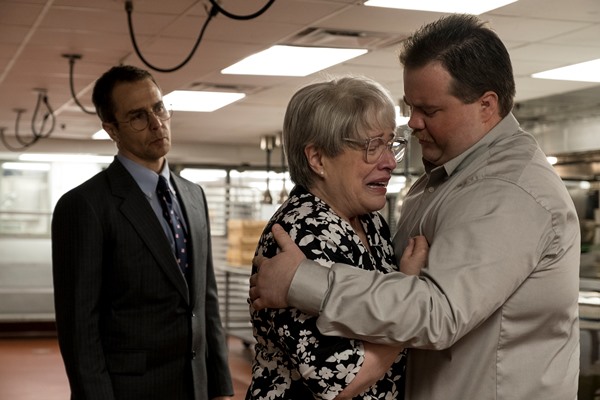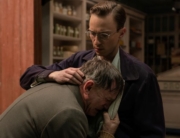
Director Clint Eastwood’s account of the bombing at the 1996 Atlanta Summer Olympics and the federal government’s flawed investigation has been filtered through two particular perspectives: distrust of the government’s machinations and suspicion of journalists.
Richard Jewell was a 33-year-old security officer who became an overnight hero following the aftermath of the bombing that claimed two lives and injured more than a hundred. He was commended for noticing the backpack that contained a homemade bomb, alerting authorities, and helping to evacuate Centennial Olympic Park, the site of the attack, before the explosion. Jewell was briefly lauded until law enforcement’s focus turned to him as a suspect in the bombing.
In its representation of Jewell, the filmmakers offer a nuanced position, inferring possible explanations for Jewell’s actions. The screenplay by Billy Ray makes it plausible why investigators began to look askance and suspiciously toward Jewell based on his pattern of behavior, before and after the bombing.
As Jewell, Paul Walter Hauser has been building up to this starring role, having played notable variations on a blundering Bubba, such as Tonya Harding’s ineffective and dimwitted bodyguard in I, Tonya, and a naïf swallowing racist bait hook, line, and sinker in Spike Lee’s BlacKkKlansman. With his slow Georgian drawl and his habit of averting eye contact, Hauser’s interpretation of Jewell could be either a shy Southern gentleman or someone who is hiding something.
Jewell’s lifelong dream was to work in law enforcement officer. However, he respected few boundaries, noticeably in his gig as a college security guard. He was fired for barging into a dorm room without a warrant and stopping motorists outside campus. He fits the profile of a “frustrated white man,” overeager to be seen as a hero, and knows way too much about how to make a bomb. It doesn’t help his case that he once impersonated a police officer, hasn’t paid taxes in years, and still lives with his mom, Bobi (Kathy Bates). The film starts off credibly and compellingly, until it turns its attention to its objects of scorn.
FBI Agent Tom Shaw, played by a stiff-lipped Jon Hamm, towers overs his partner agent, Dan Bennet (Ian Gomez), shorter and stocky. The federal government’s lead investigators are the equivalent of Laurel and Hardy, without the comedy. With his hair slicked back, Agent Shaw appears reptilian as he misleads Jewell into answering questions without officially notifying Jewell, who has become a suspect, of his Miranda Rights. Other questions surround law the agents’ ethics and actions.
The film has especially raised eyebrows for a scene where Atlantic Journal- Constitution reporter Kathy Scruggs (Olivia Wilde) sidles up to Shaw at his watering hole and begins pumping him for information over drinks. To borrow another term floating in the news nowadays, there is definitely a quid pro quo exchange going on here as her hands glide down toward his crotch. The film doesn’t imply they sleep together. It definitely states they do.
Shaw and Bennet are fictitious stand-ins for the FBI. The real-life Scruggs actually co-wrote the first story that reported Jewell was a suspect. She died in 2001 at 42. The Atlantic Journal-Constitution denies she slept with her source and has demanded that Warner Bros, the film’s distributor, add a disclaimer stating that dramatic license has been taken regarding her portrayal. Meanwhile, the film’s end credits offer the usual explanation: “The film is based on actual historical events. Dialogue and certain events and characters contained in the film were created for the purposes of dramatization.”
The cartoonish slut-shaming of the journalist and the depiction of her character as an overly ambitious, brazen sexpot tips the film toward a reactionary rant. Like an apex predator, Kathy often dresses in animal prints and is always on the go. She makes Faye Dunaway’s Diana Christiansen in Network seem overly cautious.
In her first onscreen appearance, Scruggs comes charging into the newsroom, asking a male colleague if she would look better in a D-cup, sarcastically apologizes to the other female reporters for monopolizing the front page with her bloody crime stories, and then storms away flipping everyone off. Like a villain in a thriller, she pops up when you least expect it—you have to wonder when does she have time to file her stories. It’s such a takedown of a real-life figure that it recalls Ava DuVernay’s ahistorical, scathing makeover of Lyndon B. Johnson in Selma.
Given the film’s antagonism toward authority, perhaps its real message is never actually spoken but printed on a bumper sticker in the office of Jewell’s defense attorney, Watson Bryant (Sam Rockwell), “I fear government more than I fear terrorists.” It’s featured prominently, in case you missed it the first time around.






Leave A Comment